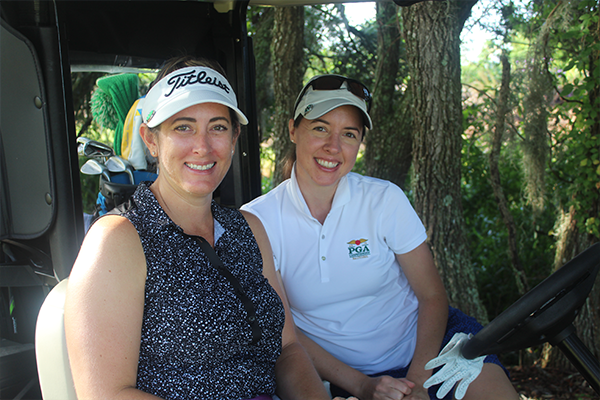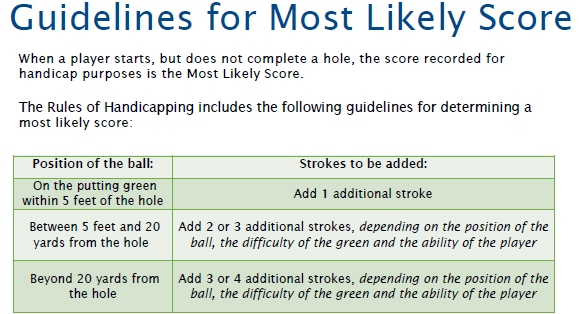Shortcut Menu
Spirit of the Game | Player Eligibility | Definition of a Team | Team of Fewer Than 4 Players | Establishing Groups & Regions | Refunds | Match Format & Scoring | Group Winners | Tie-Breaking Procedures for Groups and Wildcards | Playoffs and Regional Champions | State Championship | Low Index, Allowance and Playing Handicap | Day and Time of Matches | Pairings | Tee Selection | Golfers with Disabilities | Course Selection | Home Team Arrangements | Playing at Neutral Site | Policy for Course Usage | Practice on the Day of the Match | Team Captain's Duties | Results of Matches | Posting Individual Scores | Postponed Matches Due to Rain and Darkness | Postponed Matches within 48 Hours of a Scheduled Match | Golf Carts and Caddies | Advice and Concessions | Match Play Claims | Protests | Forfeitures | USGA Rules of Play | Balls and Implements | Withdrawals from Interclub Matches | Pace of Play | Conclusion | Handicap Manipulation
Spirit of the Game
Unlike many sports, golf is played for the most part, without the supervision of a referee or umpire. The game relies on the integrity of the individual to show consideration for other players and to abide by the Rules. All players should conduct themselves as golfers would be expected, demonstrating courtesy and sportsmanship at all times, irrespective of how competitive they may play. Please enjoy the Interclub Matches and be respectful of your team mates, your opponents and the host golf facilities.
Player Eligibility
Clubs using the GHIN Handicap System may enter players meeting the following requirements:
a. Players - Amateur Women, Professional Women or Professional Club Member with an active Florida-GHIN handicap index.
b. Playing Ability – All teams should have a mix of players with handicap Index's ranging from very low single digits up to the maximum of 36.0. This maximum of 36.0 refers to a player’s lowest handicap index over the last year at the time of being added to the Golf Genius roster.
c. Professional - Female Professionals, Female Assistant Golf Professional or Female Professional Club Members may participate. Eligible professionals must have a current numeric handicap index as of the January 1st revision. Only one professional or assistant professional may participate on the day of the match. d. Club Employees - Non-professional (amateur) female employees may participate. A non-professional employee is taking a members spot.
d. Club Employees - Non-professional (amateur) female employees may participate. A non-professional employee is taking a members spot.
e. Scoring Record – Players must have at least 10 rounds recorded for the current year prior to the January 1st revision. Players who have been unable to meet this requirement due to injury or another legitimate reason will be viewed on a case-by-case basis.
f. Age - All players must be at least 22 years of age prior to the start of a match.
g. Listing on Club’s GHIN Handicap Roster – Listing on Club’s GHIN Handicap Roster at Time of Addition to Golf Genius Roster – At the time of being added to Golf Genius, all players must have a GHIN numeric index and be listed on the club’s active GHIN roster. Additionally, they must have had an active GHIN numeric index at least somewhere on January 1st of the upcoming season year. For example, members affiliating with the club or establishing an index after the date of January 1 are eligible to compete in the current season. To be eligible, players must stay on the GHIN roster at their club for the entire season. If players do not remain on the GHIN roster they will not be eligible for the competition.
h. One Team Per Player - Players may represent only one club and one team. Penalty for playing with two teams: Disqualification for the current year's Interclub Match season from both teams.
i. One Team Per Club – Each club may have only one team, however, some very large golf communities with multiple golf courses (generally more than 36 holes, but not mandatory) may be allowed to have more than one team from their community. Please contact the FSGA if you meet this condition and wish to have more than one team from your community.
j. Penalty for Playing an Ineligible Player -Disqualification of the ineligible individual and the individual’s four-ball team in all matches in which the player has played. In the event of multiple professionals playing in the same match, the second professional to tee off is ineligible and four-ball matches will be forfeited.
Definition of a Team
a. Each team may have as many eligible players as they choose on their team roster and players may play in as many or as few matches as they wish.
b. Four (4) players from each team will be used for each match.
c. Play-offs - Players may only compete in the play-offs if they competed in at least one regular season match and continue to meet eligibility requirements.
Team of Fewer Than 4 Players
a. If a team has fewer than 4 players, they may use a substitute/alternate in accordance with proper handicap sequence procedures thus returning to 4 players; OR
b. Play with fewer than 4 players by playing a one-person team against the opponent’s two-person team. The one-person team may be placed in any position in the line-up, as long as she is in proper handicap sequence, and may play only one opponent individually in addition to the four-ball match.
Establishing Groups and Regions
Groups and regions will be established by the FSGA shortly after entries close. Clubs are grouped primarily by location to minimize travel between clubs particularly during the playoffs. During the sign up period, four clubs from the same general area may mutually agree to form a group and this group structure will be respected by the FSGA committee. To meet this condition, all four clubs must agree to be a group, they must all sign up prior to the entry deadline and the FSGA must be informed directly in writing (email) prior to the entry deadline. All clubs not in mutually agreed upon groups will be paired based on location on a first come first serve basis. There is no guarantee that a team will get in if a region fills up.
All clubs are encouraged to respect the spirit of this competition. Other clubs in your group may not be as exceptionally well designed or maintained as your home club. However, this competition is about competing with your friends against a group of potential new friends from another club. You should not be playing in these matches solely in the hope of gaining access to other golf courses in your area. If you are fortunate enough to be a member of one of the finest clubs in your area, please be a gracious host and enjoy the experience of playing other courses that you might not otherwise play. The best players typically prevail in a competition regardless of the course’s design or condition.
 Refunds
Refunds
If you withdraw before the close of entries all refunds will be a full $50. There will generally be no refunds after the close of entries except for in exceptional circumstances. For example, you are in a 3 team group and 1 team drops out leaving you unable to participate.
Match Format and Scoring
a. Generally – Each team match will consist of two groups of four players. In each group there will be two players from each team. The lowest two handicap players from club “A” will play with the lowest two handicap players from club “B”. Same method of parings for subsequent group.
b. Four-Ball Match (Best Ball of Two) - The two players from Team “A” in the first foursome will compete against the two players from Team “B” in an 18-hole four-ball match. The scoring will be a Nassau Team Match, 2 point for the front nine, 2 point for the back nine and 2 point for the total. Tie's being split 1/1. Same method and matches for all four foursomes.
c. Matches – Typically matches are to be played on Wednesday. Matches will be scheduled on a week to week basis and should be completed the same week they are scheduled any rescheduled matches must be completed before the final day of the regular season. Team captains can mutually agree to play their match on a different day and they may also switch their home and away matches to avoid other club competitions. Captains who can agree are given great leeway in the scheduling of their matches. However, if captains cannot agree on scheduling, the match is to be played at the course and day scheduled.
d. Match Points – Accordingly, each competition will result in: (2)Two Four-ball matches for 12 total points - Nassau Score Match - Front Back and Total
e. Winning Team – Determined by Match Points tied matches are not broken except during the post-season play-offs.
f. Group Points (The Most Important) – At the completion of the match, teams are awarded points on the following basis: Winning Team = 3 points, Team Ties = 1.5 points each; Loss = 0 points
Note: Group points reflect your teams win-loss record and these points are used to determine your group’s winner. Example: Group points are similar to games won in baseball or hockey. In baseball, it does not matter how many “runs” a team wins by-each win counts as one game. Similarly, if you win your match 12-0 you have still only won one match and you earn 3 Group points for winning. (Match points only come into effect at the end of the regular season and only as part of the tie-breaking procedure for determining group winners and home-field advantage for the playoffs).
Group Winners
a. Groups – Each “group” will ideally contain four teams which will compete against one another during the regular season. Over six weeks, each team will play each of the other three teams in the group two times – once at home and once away. The group winner will be the team with the most Group Points (win-loss points) at the end of the season. In the event of a tie, there is an established tie-breaking method described under “Tie Breaking Procedures”.
b. Groups with Three Teams – In the event that a group has only three teams, each team will play the other two teams in the group twice – once home and once away over the six week regular season.
Accordingly, teams from groups of three will play only four matches and team will have two weeks on the schedule where they will not have a match. The group winner will be the team with the most Group Points (win-loss points) at the end of the season. In the event of a tie, see Tie Breaking Procedures for Groups.
c. Region Full and Alternate Teams – Once an area has 16 teams (four groups with four teams each) the region will be full. Additional “regions” may be added to accommodate more teams, but this may not always be possible. Teams will be accepted on a first-come, first-serve basis.
Tie-Breaking Procedures for Groups and Wildcards
(To Determine Group Winners and Wildcard Teams)
- Group winners will be determined by the team with the highest Group points: (3 points for a win, 1.5 point for a tie, 0 points for a loss)
- In the event of a tie between two or more teams with identical Group points, the group winner will be determined by:
- Direct wins between tied teams (In a tie of 3 or more teams, total wins vs. all tied teams)
- Direct Match Points (In a tie of 3 or more teams, total match points vs. all tied teams)
- Total Match points won in all matches against all teams
- Total match points earned in, their last three matches; then their last two matches; then last match ( Manual Adjustment )
- Coin flip
- In the event of a tie between two or more teams with identical Group points, the group winner will be determined by:
c. Wildcard Teams – (Three Group Regions Only) Since wild card teams do not compete directly against one another during the regular season, any ties by overall points will be determined by:
- Total match points won in all of the team’s matches
- Total match points won in the team’s last two (2) away matches
- Total match points won in the team’s last away match
- Coin Flip
v. Groups with only three teams – Points Adjustment – For determining home field advantage and tie breakers, teams from groups of three teams will have their overall and match points grossed up by 150% so that they will be on a comparable basis with groups of four teams.
Playoffs and Regional Champions
a. After the regular season, four Group Champion Teams will compete over two rounds of playoffs to determine the Regional Champion. (Teams will be paired by the FSGA Committee for the play-offs.)
-
Three group regions will include a wild-card team.
-
Two group regions will have each group winner advance to the playoffs. The winner will advance to the State Championship
b. Teams will be “seeded” based on each team’s overall record from regular season play. The seeds will be used to determine who receives the home course advantage for the second match of the playoff. Group points will be used for this test, and if overall points are tied, then total match points will be compared. If the teams are still tied, then the tie will be broken by comparing 18 Hole Total match points. If the teams are still tied, then the tie will be broken by a coin flip. (Teams from groups of only 3 teams will have their Season and match points grossed-up by 150% for purposes of determining home field analysis). Wildcard teams will be the fourth seed in their playoff region.
c. The playoff matches will be conducted on the courses of the competing teams, according to all regular Interclub rules.
d. For each round of the playoffs, each team will play two matches against their opposing team on a home-and-away basis, conducted over two weeks. The winner will be determined by the Match Points earned in the two matches.
e. Ties – The results from the fourball matches at each site combine to yield 24 total match points. If a tie at 12-12, whatever team had more total group points during the regular season will move on. If that is a tie, see The Tie-Breaking Procedure for Playoffs section below.
f. Eligibility - Only players who have played in at least one team match during the regular season shall be eligible to participate in the playoffs. Any infraction of this rule shall result in forfeiture of all four-ball points won during the play-off match by the ineligible player(s).
Players who were scheduled to play in a match that was cancelled are not eligible to play in the playoffs unless they have played in another match during the season.
g. Regions with Three Groups (Wild Card Team) – In some cases a region will only have three groups. After the regular season, each of the group winners will advance to the playoffs. Additionally, the highest ranking second place team, the “Wild Card Team”, based upon Group Points (awarded for wins and ties), will advance to the playoffs. If there is a tie based on Group Points, then the team with the highest number of total “Match Points” from all their matches will advance. See Tie-breaking Procedures for Groups in a section listed above.
h. Regions with Two Groups – In some cases a region will only have two groups. After the regular season, each of the group winners will advance to the playoffs. The playoff winner will advance to the State Championship.
Tie-Breaking Procedure for Playoffs
- First - the total match points won in all regular season matches
- Second - total match points won in the team’s last two (2) regular season away matches
- Then, total match points won in the team’s last regular season away match; then by coin flip
- Groups with only three teams – Points Adjustment – For determining home field advantage and tie breakers, teams from groups of three teams will have their overall and match points grossed up by 150% so that they will be on a comparable basis with groups of four teams.
State Championship
a. 36-holes of Stroke play
b. FSGA pays for both competitive rounds
c. Dates – The Championship will be held middle of April
d. Practice Rounds available through club at standard rates
e. Eligibility – Each Regional Championship Team will advance to the State Championship. Four (4) team members from each team will compete in each round and all four players must have competed in a minimum of two matches. The two matches can be played at any time in the season and do not have to be one regular season match and one playoff match (i.e. it is okay to play in two regular season matches and no playoff matches).
f. Roster – You may bring as many players on your team that fulfill the eligibility requirement. You may play each round with any combination of four (4) players per round. Team captains may decide which four players participate per round in any manner they wish.g. When two courses are being used for the Championship, the Championship Committee permits practice on the competition course or part of any course on any day between rounds of the Championship. As a result, competitors are allowed to play a practice round on the course remaining to be played after the first round.h. Format – Unlike the regular season and playoffs which are conducted using match play, the State Championship will be conducted using Stableford stroke play. Each team’s daily score will be the sum of:
i. Their three (3) highest Net Stableford points.
ii. Players whose scores are not used on day one can have their scores for the second round count.
iii. Players who are disqualified under a Rule of Golf during the first round will remain eligible for the second round.I. Championship – The Champion team will be determined by the team with highest Net Stableford points.
j. Play-Off – In the event of a tie, a sudden death, hole-by-hole playoff will be conducted.i. The sudden-death playoff will involve the two(2) lowest index players from each team involved.
ii. The combined Stableford net score of the two players from each team will be used to determine the winner. The playoff will continue until the tie is broken.k. Awards – All teams that advance to the Championship will receive trophies to display at their club.
 Player Handicaps
Player Handicaps
Low Index, Allowance and Playing Handicap
a. Indexes - All players must play to their Low Index (LI). Low Index will be locked on Jan 1st for the regular season. Updated for the playoffs.
b. Four-Ball Matches -Playing Handicap - In each of the four-ball matches the player with the lowest unrounded course handicap will play at scratch. Each of the other three players in the group will receive 90% of the Un-Rounded Difference in Course Handicap (USGA Recommendation).
c. Stroke Allocations – Regardless of the starting tee, in all cases the allocation of handicap strokes will remain as listed on the scorecard.
d. Player’s Responsibility for Handicaps - In accordance with Rule 3.2 of the Rules of Golf, before the start of each match it is the responsibility of each individual player to ensure that their correct handicap is being used for the competition and to know the holes at which handicap strokes are to be given or received.
Day and Time of Matches
a. Wednesday Matches – Typically matches are to be played on Wednesday. Team captains may mutually agree to play their match on a different day and they may also switch their home and away matches to avoid other club competitions or conflicts. Captains who agree are given great leeway in the scheduling of their matches. However, if the captains cannot agree on alternative scheduling, the match is to be played at the course and day originally scheduled by the FSGA.
b. Tee Times – Tee times are to be determined by the host team; preferably a mid-morning start on Wednesday with adequate time for all groups to complete play prior to darkness.
Pairings
a. During all Interclub matches (including the play-offs and Championship), players for each club must be paired in Lowest Handicap Index sequence from low to high, including the two-man teams, with the lowest-handicapped player listed first. (Example: the two lowest-handicapped players must be paired together and play as Team #1, the next two and Team #2, etc.)
b. Order of Play – The first group to tee off should include the two lowest handicap players from each team. However, if both captains agree, the order of groups can be revised to accommodate players that are delayed in arriving. In all cases, each group of four players must be grouped according to the correct handicap sequence. If the captains cannot agree on a revised order-of-play, the matches shall be played with the lowest-handicapped players teeing off first. The FSGA strongly encourages captains to work together to revise the order of groups when necessary to accommodate players with travel delays.
c. In the event that a last minute substitution would result in an improper sequence, the substitute player must play with a handicap that is in proper sequence. (Example: A substitute with a handicap of 10 cannot be placed between players with handicaps of 6 and 8. The substitute would be required to play with a handicap of 7 in this instance.) However, if time permits, the pairings should be adjusted. A player with a lower handicap may not be substituted without adjusting the pairings.
d. If players are not paired in lowest handicap Index sequence according to the procedures outlined above, or, if a player should play with an improper handicap, the team in violation shall forfeit all team four-ball match points won during the match by the player(s).
Tee Selection – Different Foursomes May Use Different Tees
a. The tees to be used for Interclub Matches should be the set of tees typically used by the Women in daily play at the host club. However, captains are encouraged to have groups play from the distance that they are most comfortable (see playing different tees below.)
b. Minimum Yardage - The minimum yardage for Interclub Matches is 4,700. Each match must be competed from tees that measure at least 4,700 yards. Courses measuring less than 4,700 yards are not eligible to compete in Interclub.
c. Recommended Yardage –The recommended yardage for Interclub Matches is 4,900 yards, plus or minus 200 yards. If a host club wishes to play from a yardage that is more than 5100 yards, it must be mutually agreed upon by both captains prior to the start of the match.
d. Playing Different Tees -Whole groups may play from different sets of tees. Home Team captain will set the course and tee that each whole group will play from.
Golfers with Disabilities
The following local rules only apply to players using a wheeled mobility device and holding a WR4GD Pass or EDGA Access Pass.
a. Model Local Rule M-1 Placing the Ball for Players Using Wheeled Mobility Devices is in effect. The player may roll the ball up to six inches and the ball must remain in the same area of the course, and in the same area of grass cut.
b. Model Local Rule M-2 Free Relief from Specified Bunkers for Players Using Wheeled Mobility Devices is in effect. All bunkers on the course that a player using a wheeled mobility device deems is virtually impossible for the player to get in and/or out of the bunker are ground under repair for the player.
c. Tee Selection: A player using a wheeled mobility device may play a more forward tee approved by the Committee, provided the player's handicap is calculated properly for that tee.
Course Selection
a. Clubs with more than 18 holes at their facility may schedule matches on any Slope-rated regulation length course at their club. These clubs may use more than one course at their facility during the Interclub Match season. Such clubs should inform opponents of which course will be used well in advance of the scheduled match.
b. Captains are responsible for knowing the Slope rating for the set of tees they will play at their club and this information will be displayed on the Interclub Website. If the Slope rating changes during Interclub Match season, it is the responsibility of the host captain to verify that the revised course and slope rating are accurately reflected in the Interclub Website. The FSGA office should be contacted immediately if discrepancy exists.
 Home Team Arrangements
Home Team Arrangements
a. No Green Fees – During the regular season and playoff matches, the home team is required to host for green fees. (Neither club should charge any green fees).
b. Cart Fees – Cart fees are at the host club's discretion (Recommended to not charge over 30 dollars).
c. Practice Rounds – Clubs are encouraged to provide the visiting team a practice round opportunity at a cart-fee rate. However, clubs are not required to provide practice rounds and they are not required to host them for only a cart fee. Teams should not expect practice rounds and they should not take more than 8 players to any practice round unless encouraged by the host club.
d. Complimentary Items - Participating clubs may provide complimentary services such as practice rounds, golf carts, range balls food and/or beverages as part of their host functions; however, they are under no obligation to do so. Normally the extent to which a club exercises these options depends on the ability to reciprocate and is mutually agreed upon by all clubs competing against each other during the regular season. During play-off rounds, these same options are available to competing clubs; however the FSGA recommends that unless both clubs involved can reciprocate, neither should expect it.
e. Match Arrangements – All information about the scheduled match including tee times, cart fees, practice round availability, dress code, etc.., should be communicated with the opposing captain before each match. Please be a good captain and set up your home matches and send the arrangements to the visiting captain(s) as soon as possible – this information will greatly assist the visiting teams traveling to your matches.
Playing at a Neutral Site
If both the home and away course cannot host the match at any point during the scheduled match week, or they cannot play the match during the scheduled make-up week, a match can be played at a neutral site if it’s agreeable by both team Captains during the week the match is scheduled to be played.
Policy for Course Usage
It is required that any team electing to participate in Interclub Match play shall make available its home course for all scheduled regular season matches, make-up of all postponed or suspended matches, and playoff matches. If the course cannot be made available on the dates stipulated by the Interclub Match Play Committee, and there are no arrangements by the host team to play the match at an alternate site or play the match at the opposing team’s course, the host team shall be deemed to have forfeited that match in accordance with the procedures (Forfeitures). The circumstances pertaining to such forfeiture shall be reviewed by the Committee and may result in disqualification from future Interclub Match play competition. Whenever possible, make-up matches should take place on the day the teams normally played matches during the regular season. If this cannot be accomplished due to conflicts by one or both teams, the Captains must strive to reschedule the match on another day.
Practice on the Day of the Match
Practice will not be allowed on the host course on the day of a match prior to the beginning of the round during the regular season as well as during playoffs and the championship match. Penalty for violation of this rule will be disqualification of the player, if a valid claim is made by the opposing Team Captain; however, another player may be substituted in their place.
Team Captain’s Duties
It is the Captain’s responsibility to contact the other captains in the group. A Head or Assistant Golf Professional can be a captain. However, if a Golf Professional is a captain of a team, a non-golf professional member of that club must serve as a co-captain. Golf professionals are often very busy and may not be the best person to handle the administrative functions of the captain. Teams may have as many co-captains as they wish and captains can be added through the website by any other captains at anytime
a. Pre-Season Meeting – Once groups are formed, the captains from each group should get together and meet prior to the beginning of the season. Perhaps one captain could host the three other captains from the group for a round of golf at their club, or the captains could meet at lunch or some other convenient time. Captains that have met in advance of the season will be much more successful coordinating team matches and resolving any conflicts once the season begins. The success of the Interclub Team Matches relies heavily on the good nature and common sense of the captains.
b. Captain's Match Printout – The Interclub Website will allow each captain to print out a complete match set-up page, including players competing. This information should be taken to the match and can be used for recording the match results for later entry into the website by the host captain. If this information is not available at the time of the match, captains can obtain the required information from the club’s handicap computer or by using a club computer to access the Interclub Website.
c. Match Arrangements – The host Team Captain, in coordination with the visiting Team Captain should arrange for matches to be played by the date scheduled by the FSGA. If the host club cannot make the course available, arrangements must be made for an alternate date within the allowable schedule.
CAPTAINS TIP: The FSGA recognizes that previously scheduled club events can impact on scheduled Interclub Matches. However, the policy of permitting teams to play on other days of the week provides sufficient flexibility to accommodate all clubs and Team Captains are expected to cooperate with each other.
Results of Matches
When Result is Final - The result of a match becomes final after the conclusion of play when all players and captains agree to the final result at the scoring table or scoreboard. In some cases the official scoreboard will be prominent structure in other cases it might just be a sheet of paper in the grill room, lounge or outside patio area.
Results should be entered on the Team Captain FSGA Interclub website as soon as possible following play – ideally on the evening of the match. The host team captain is responsible for posting results, but by agreement the visiting captain may post results. All results should be posted no later than 12:00 Noon – the day after the match occurs. Any problems with the FSGA Interclub website should be sent to the FSGA Interclub Match email address:interclub@fsga.org
Posting Individual Scores
Scores posted from the Team Play Module will automatically be posted by the home club captain to the individual player's GHIN account. Scores will be posted as rCompetition Scores. Season Championship scores will be posted by the Committee as Competition Away score.
a. Expected Score - New rules of handicapping require you to leave a hole not played blank. Golf Genius will post the correct Expected Score.
b. “Score Most Likely to Have Made" – If a player starts a hole but does not complete the hole, or is conceded a stroke, she shall record for handicap purposes “the score she most likely would have made.” This score shall not exceed her Net Double Bogey limit (based on current index).
Postponed Matches Due to Rain and Darkness
a. All Interclub matches are to be played as scheduled unless the course is officially closed to all play because of inclement weather. However, Team Captains can mutually agree to postpone the match in advance of the start of play or during the course of the match due to actual or predicted unfavorable weather conditions.
b. Inclement Weather: In the event the course is officially closed to all play because of inclement weather or play is suspended due to darkness during the progress of a Match, the following procedures will apply:
i. The decision to officially close the course to all play shall be at the discretion of course management.
ii. The Team Captains are in turn to notify their respective players and remove their teams from the course. All team members shall proceed to the clubhouse and remain until the decision to close the course is final.
iii. Team Captains are to verify the results of each match up to the point when play has been suspended and record and attest the scores prior to leaving the course.
iv. If the course is closed only to the use of golf carts, matches will continue with the players walking.
v. If the course is officially closed or play is suspended due to darkness or weather conditions, the following procedures will apply:
1. If all matches have not completed 9 holes, and the course has been officially closed to all play or captains mutually agree to postpone the match due to inclement weather, the entire match must be replayed. It is not required that the same players participate in the make-up match.
2. If the match is postponed and all players have completed 9 holes, the match stands as completed at the time of play is halted, and Team Captains will verify the results of each match through the number of holes completed and record and attest the results prior to leaving the course.
c. Rescheduling: Match postponements must be rescheduled at the earliest available date which is mutually agreeable to both teams. This date must not be any later than the final Wednesday of the regular season, unless a valid postponement occurred for a match that was supposed to be played during the last week of the regular season. In this situation, it must be played by the end of the week that follows the last week of the regular season.
i. The FSGA Office should be notified of the make-up date for any postponed match.
ii. All matches must be completed by the date specified - one week after the last regular season match unless authorized by the FSGA.
iii. Any match not completed by that date will be treated as “no match” for both teams in determining the final group standings, meaning that both teams will receive zero points from the match.
CAPTAINS TIP: Due to time constraints involved with playoff matches, there may be occasions when teams must reschedule a postponed playoff match on a day other than Thursday to allow for the continuation of the playoff schedule. Team Captains will have to mutually agree to reschedule on an alternate date. If such an agreement cannot be met, the FSGA Interclub Match Play Committee will serve as final arbitrator.
Postponed Matches within 48 Hours of a Scheduled Match (matches postponed for reasons other than weather)
a. All matches should be played on the scheduled day. Any match cancled or postponed with 24 hours, without agreement is automatic forfiet.
b. A team is allowed one "free pass" per season for a postponement within 48 hours of the scheduled match starting time.
The team that was canceled on gets the ultimate final choice on the replay date. The replay must occur before the end of the season.
c. Any subsequent postponement within 48 hours of a scheduled match starting time will result in disqualification for the season.
d. If a team is disqualified for the season, their previous matches stand. All future scheduled matches will be scored as 9-3 victories for team(s) that had remaining matches against the disqualified team.
Golf Carts and Caddies
a. Golf carts will be used subject to the host club’s rules and regulations governing the use of these carts.
b. In the event caddies are made available by the host club, an equal number of caddies must be made available for each team. Customary caddies’ fees are to be paid even though they will often exceed cart fees.
Advice and Concessions
a. A concession of a stroke is deemed to be conceded for the four-ball match.
b. A concession of a hole or match is deemed to only apply to be conceded for the four-ball match.
c. Four-Ball partners may give each other advice at all times.
d. Playing After Match Completed – Players may complete their 18-hole round even though their match is complete, however, they are not required to do so.
Match Play Claims
Players competing in Interclub Matches are reminded of Rule 20.1b of The USGA Rules of Golf which states that “A ruling will be given only if the request is made in time, which depends on when the player becomes aware of the facts creating the rules issue. When the player becomes aware of the facts before either player starts the final hole, the ruling request must be made before either player makes a stroke on the next hole. When the player becomes aware of the facts during or after the final hole of the match, the request must be made before the result is final. If the player does not make the request in this time, a ruling will not be given and the result of the hole(s) in question will stand even if the Rules were applied in the wrong way."
Please Note: Once a valid and timely request for a ruling is made, players are to continue their match without delay. DO NOT WAIT FOR A DECISION!
Protests
All protests must be emailed to the FSGA by the Team Captains within one business day of the conclusion of the match. The protest must be sent to interclub@fsga.org. Protests should deal with Interclub policy issues (i.e. course was set at yardage under 5800 yards.) If any rules issues arise, players must make a timely claim (see paragraph above.) To file a protest, both team captains must be aware that the match is in protest beforehand.
Forfeitures
A forfeiture is highly discouraged. All previous matches played by a team that withdraws will stand and any remaining matches will be scored as an 9-3 victory to team(s) that had any remaining matches against the forfeited team. Teams who forfeit the season will have to donate $250 to the FSGA’s Future of Golf Foundation in order to participate in the following season. If the forfeiting team fails to donate $250, they will not be allowed to participate in following season.
USGA Rules of Play
a. Current USGA Rules of Golf will govern all matches. Understanding Rule 3.2 (Match Play) and Rule 23 (Four-Ball) is essential in comprehending the format of Interclub Matches. The Rules of Golf may NOT be waived at any time. The penalty for waiving the Rules of Golf is disqualification for the player or team who is in violation of this rule. Example: Agreeing prior to the match that everything inside of the leather is good.
b. There is no time limit on applying the penalty for agreeing to waive the rules. Results of matches of teams will be adjusted if such a violation is brought to the attention of the FSGA Interclub Match Play Committee.
c. Local Rules - The FSGA Hard Card (Local Rules and Terms of the Competition) is in effect with the exception of the statement "Disregard Local Rules printed on the club scorecards or posted at the course." Also, any additional Local Rules in effect at the host course must appear printed on the club scorecard, or be published at the club, and distributed or communicated to all players in advance of the start of the match. Any Local Rules in effect at the host course are in addition to the FSGA Hard, or supersede a conflicting Local Rule on the FSGA Hard Card.
d. Winter Rules – “Winter rules” or “preferred lies” are strongly discouraged in Interclub Matches. If it becomes absolutely necessary to use “preferred lies”, the procedure shall be determined by the host club in advance of the start of the match. It is strongly recommended by the Interclub Match Play Committee to adopt the Model Local Rule for preferred lies E-3 in the Committee Procedures section of the Rules of Golf.
Balls and Implements
a. Only golf balls in the USGA’s latest book of conforming golf balls may be used. Penalty for use of brand not on the list: Disqualification.
b. The One-Ball Rule will not be in effect for any phase of Interclub Matches.
c. A player’s clubs shall conform under the Rules of Golf. See Rule 4.1 and the USGA's conforming club and balls list for more information.
d. A maximum of 14 golf clubs may be carried during the stipulated round.
 Withdrawal from Interclub Matches
Withdrawal from Interclub Matches
The withdrawal of a team at any time after the pairings have been announced may result in ineligibility for Interclub Matches until the second year following the year of withdrawal. All previous matches played by a team that withdraws will stand and any remaining matches will be scored as an 9-3 victory to the team(s) that had any remaining matches against the forfeited team.
Pace of Play
Slow play is a recurring problem in Interclub. Unfortunately playing out of turn is not permitted in match play unless agreed upon by the players. Nevertheless, each player should manage his time efficiently between shots and be ready to play when it is his turn. All groups should keep pace with the group in front of them. If they fall off that pace, players should make every effort to regain position behind the group in front of them.
Team Captains and all team members should be aware of The Rules of Golf and Rule 5.6 which states that all players shall play without undue delay and within 40 seconds. Moreover, players should be reminded of concessions and that if it becomes obvious that they are not going to win a hole that they should tell their opponent to pick it up and move on! Golf is much more enjoyable when you’re not waiting on every shot.
Pace of play can and should be monitored by a club staff member and/or team captains. The club staff member and or team captain has the authority to impose the following penalty for slow play.
The lead group is allowed 15 min a hole, if there is no group in front and they fall out of pace they can be warned. After the second warning they will be asked to move forward to a position in accordance with the proper time and or the position of the group in front.
If a group maintains an open hole between themselves and the group in front of them and has been warned twice, regardless of where they are, they can be asked to pick up their balls and advance to the position on the course that will put them in proper position. The match point for the holes will be split. (Any hole not started and not completed players will mark a mostly likely score for posting purposes and leave blank any hole not started)
This penalty will affect the offending 4-some only. Any group following will be provided a grace period of two-three holes to catch up in a timely fashion.
Conclusion
If the players follow the guidelines in this manual, it will make the game more enjoyable for everyone. If a player consistently disregards these guidelines during a round or over a period of time to the detriment of others, it is recommended that the Committee consider taking appropriate disciplinary action against the offending player. Such action may, for example, include prohibiting play for a limited time on the course or in certain number of competitions. This is considered to be justifiable in terms on protecting the interest of the majority of golfers who wish to play in accordance with these guidelines. In the case of serious breach of Etiquette, the Committee may disqualify a player under Rule 1.2 or 20.3.
Handicap Manipulation
Everyone in golf has experienced problems with players who have handicaps that are “less than representative of that player’s true playing ability”. An occasional exceptional round is not out of the ordinary. However, a series of sustained exceptional performances by an individual not only defies the odds of handicapping statistics but, more significantly, defeats the very purpose of net competitions.
Accordingly, if a player scores significantly better than her handicap index, her course handicap may be subject to reduction in future matches and the playoffs. If the Committee has to review the same player a second time, that player may be refused entry into FSGA events for a period of up to two years. When a player’s course handicap is reduced, the Team’s Captain will be notified. The reduction process is subject to revision without notification by the FSGA Committee. The FSGA staff members have met with the certified handicap chairpersons at various clubs. One topic being discussed is the importance of each local handicap committee making certain that individuals whose indexes do not properly match their playing potential are dealt with at the club level before the FSGA has to get involved. All clubs are reminded that it is within the purview of the club handicap committee to adjust or freeze the index of a player who fails to turn in proper scores or consistently scores better in tournaments than normal play.








